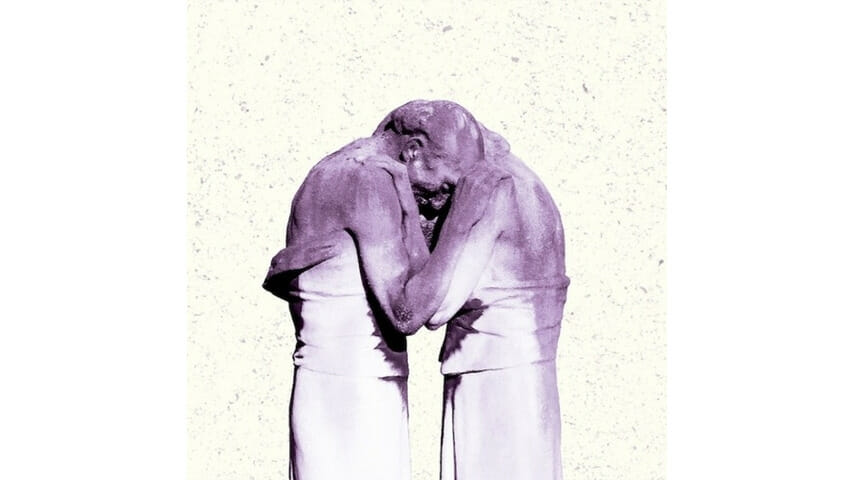
“Sad” is a catch-all we use to describe music that turns inward, reflects and exists without concern for how its audience is going to feel about what they hear. It is about expression, relating and both comforting and being comforted. This year has had no shortage of such, from wounded (Lykke Li, Sharon Van Etten, Beck) to pensive (Sun Kil Moon, La Dispute) to the talk of the moment, Lana Del Rey. Speaking with Pitchfork this year, Annie Clark (St. Vincent) described her album closer “Severed Crossed Fingers” by noting, “I sang that in one fucking take, cried my eyes out, and the song was done.” And if you really are versed in pain and need some more advanced product, the freebase of sad, try Lydia Loveless or Strand of Oaks or Angel Olsen. In terms of self-reflective music, 2014 is a banner year.
The Antlers’ fifth LP, Familiars, fits neatly in this conversation, which is no surprise considering their most beloved album takes place in a cancer ward and their last LP ended with a song called “Putting the Dog to Sleep.” But, to simply label these nine songs as “sad” is getting stuck in some of the sonic cues (down-tempo rhythms, beautiful whining trumpets from Darby Cicci); the album is ultimately the most cathartic and uplifting that songwriter Peter Silberman has crafted, indicating the demons he has long wrestled with may be tiring, if not nearing defeat.
Even at his darkest, Silberman has had a knack for crafting beauty out of pain, and that’s where “Palace” begins, with the dual reading of losing sight of your old self or losing connection with a changing love. Either way, the song illuminates the pedestal we place idealized memories on. But musically, it could be a Disney ballad, as unmasked heartstring-pulling as you will find west of “Can You Feel the Love Tonight” and “A Whole New World.” Those songs, jokes aside, are obvious in their intention to make an audience feel a specific vitality at a certain moment, and Familiars finds hope in vitality.
“Hotel” again sees the separation of the past and present versions of who we are, only to acknowledge that “I keep sleeping with my old self.” The album seems to allow for multiple readings on this. There is a loss of innocence there, life weighing down on someone until they are not same person you remember. But, there is also healing in this change, where past trauma can be put to rest by leaving your old self behind.
With this kind of weight behind Silberman’s broad yet concrete imagery, it is easy to read every word as symbolic, whether that is the home invasion vividly described on the masterful “Revisited” or the titular event on “Parade,” all easy enough to get the implied double meaning they present. But the songs still work on some level as literal storytelling, though the audience is unlikely to take that bait.
So how is this uplifting? Though the songs may seem to be mourning loss of connection to the past, there is the implication of survival throughout, that being able to lose connection to the past is a privilege afforded to those who make it. Others get stuck there, either literally through death or psychologically through nostalgia. A look around at our present state as Americans sees many of our friends and peers demonstrating the inability to divorce the present from the past. Silberman is driven to profanity by his own wars (some of the best uses of the word “fuck” in song are featured on this album) or often he finds his voice calling out in desperation, never before sounding as controlled and powerful as on this album. Coming from a man that said on “Hospice” “we’re fucked and not getting unfucked soon,” this shift of thinking is virtually inspiring, and not just for him, but for the possibilities in everyone. The questions he asks on Familiars never sound self-absorbed and seek as much to relate to others as to express himself, leading to a conclusion that completes the songwriter’s shift away from simply being “sad.”
“It’s not our house that we remember, it’s a feeling outside it,” he says on closer “Refuge,” completing the split from sentimental longing by acknowledging that we are just looking for a feeling that we once had, whether that was hope, stability, comfort, safety or whatever else could be evoked from your family home. “When everyone’s gone but we leave all the lights on anyway,” he adds on, which is what you do to protect a house. Knowing what to let go of and what to guard is tricky business, and we all probably still get it wrong, but realizing there is a distinction is an enlightened, redemptive truth, like the discovery of gray in a black-and-white world.